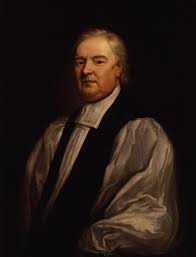Today, in my course on "
The Faiths of the Founding Fathers," I lectured on the shift in theological beliefs that occurred in the seventeenth-century Anglican Church. My lecture was based on material found in C. F. Allison's
The Rise of Moralism: The Proclamation of the Gospel from Hooker to Baxter, Roland Stromberg's
Religious Liberalism in Eighteenth-Century England, C. R. Cragg's
From Puritanism to the Age of Reason: A Study of Changes in Religious Thought within the Church of England, 1660 to 1700, Knud Haakonssen's edited volume,
Enlightenment and Religion in Eighteenth-Century Britain, Alister McGrath's
Iustitia Dei: A History of the Christian Doctrine of Justification: Volume II: From 1500 to the Present Day, and Isabel Rivers's
Reason, Grace, and Sentiment: A Study of the Language of Religion and Ethics in England, 1660-1780.
In my lecture, I sought to explain the following terms: Puritanism, Dissent, Latitudinarianism, the Cambridge Platonists, Arminianism, Arianism, Deism, and Socinianism. We had already talked quite a bit about Puritanism, Dissent, Deism, and Arminianism. My primary objective for today was to focus on
Latitudinarianism. I argued that when deciphering the faiths of the Founding Fathers with Anglican roots, it is essential to understand that term. George Washington's faith, for example, becomes less murky if one knows what Latitudinarians believed.
I went very slowly today in describing how many of the Caroline Divines viewed justification as both an event and a process that included regeneration and sanctification. In this way, faith in a believer becomes the
formal cause of justification, rather than Christ's imputed righteousness (what many of the Puritans argued). If you understand that there was a change in theological beliefs in England after the restoration of Charles II, which promoted justification as a process that depended on a person's contribution of faith, it easy to see why morality became so important in the latter half of the seventeenth century and into the next century.

The pejorative term "Latitudinarianism," has been used to describe those divines who sought to promote Christianity in its simplest form, so that it could be believed by rational people and utilized for benevolent purposes. Latitudinarian Anglicans like Bishop
John Tillotson wanted to preach sermons that an average parishioner could understand, as opposed to the metaphysical and speculative message that they perceived came from Puritan pulpits. Latitudinarian ministers accused the Puritans as obscuring the plain meaning of true Christianity with their complex terms and doctrines. They particularly did not like the Calvinistic notions of irresistible grace and imputed righteousness because there appeared to be no human responsibility in these doctrines. Rather, the Latitudinarians argued that Christianity should be based on morality (with the ultimate goal of happiness), and filtered through the sieve of natural reason.
I hope to spend more time on Wednesday discussing some of these terms and beliefs, as they relate to Founding Fathers like Washington and Edmund Randolph.
No comments:
Post a Comment